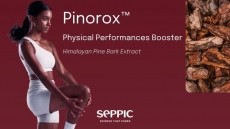Study: Nitrate supplementation improves muscle performance

“Our research has already provided a large body of evidence on the performance-enhancing properties of dietary nitrate, commonly found in beetroot juice,” said Andy Jones, professor of applied physiology at the University of Exeter. “Excitingly, this latest study provides the best evidence to date on the mechanisms behind why dietary nitrate improves human muscle performance.”
The research, published in the journal Acta Physiologica, was conducted in collaboration with the University of Queensland, Australia, under the QUEX partnership with Exeter.
Tracing nitrate during exercise
Dietary nitrate is converted to nitrite (NO2−) by oral commensal bacteria under the tongue or in the stomach and then into nitric oxide (NO) through non-enzymatic synthesis. An essential molecule, NO confers ergogenic and cardioprotective effects by relaxing blood vessels and increasing blood flow with a promise to boost strength and endurance during exercise. This study builds upon the growing research into the role of NO3− supplementation in increasing NO bioavailability in the body.
“Determining the proportional contribution of exogenous NO3− and endogenously generated NO3− to total NO3− in muscle as well as other tissues following dietary NO3− supplementation would provide important insight into the distribution of ingested NO3−,” the researchers wrote.
To better understand the mechanisms at work, they used a stable isotope tracer (K15NO3) to track the metabolic fate of ingested NO3− at rest and following exercise with a focus on skeletal muscle.
Study details
The randomized, crossover study recruited 10 healthy participants between the ages of 19 and 27. Exclusion criteria included use of antibacterial mouthwash or tongue scrapers, dietary supplements, blood pressure medication and tobacco smoking. Females were eligible to participate but only males volunteered.
One hour prior to performing 60 quadricep contractions at maximum intensity, the test group consumed 12.8 mmol 15N-labeled potassium nitrate (K15NO3; NIT), while the control group ingested a potassium chloride placebo. Muscle, plasma, saliva and urine samples were analyzed throughout the experiment to determine absolute levels of NO3− and NO2− and the proportion that was 15N-labeled.
“By tracking the atoms within metabolites, we also show that following its elevation by dietary supplementation, muscle [NO3−] falls substantially during exercise and that both the pre-exercise muscle [NO3−] and the magnitude of its decrease during exercise are correlated with muscle torque production during maximal voluntary contractions of the knee extensors,” the researchers wrote.
In addition to increasing plasma, salivary and urinary nitrate levels, the study noted the rapid uptake by skeletal muscle following acute inorganic NO3− ingestion, resulting in a 7% increase in muscle force during exercise compared to placebo.
“This study provides the first direct evidence that muscle nitrate levels are important for exercise performance, presumably by acting as a source of nitric oxide,” said Dr. Barbara Piknova, research collaborator and staff scientist in the National Institute of Diabetes and Digestive and Kidney Diseases at the National Institutes of Health.
“These results have significant implications not only for the exercise field, but possibly for other medical areas such as those targeting neuromuscular and metabolic diseases related to nitric oxide deficiency.”
Source: Acta Physiologica
“N-labelled dietary nitrate supplementation increases human skeletal muscle nitrate concentration and improves muscle torque production”
doi: doi.org/10.1111/apha.13924
Authors: Stefan Kadach et al.

















